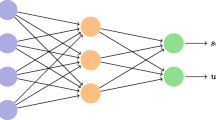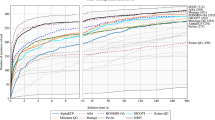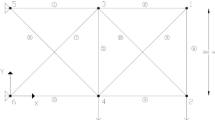Abstract
This paper introduces a new framework for solving quantified constraint satisfaction problems (QCSP) defined by universally quantified inequalities on continuous domains. This class of QCSPs has numerous applications in engineering and technology. We introduce a generic branch and prune algorithm to tackle these continuous CSPs with parametric constraints, where the pruning and the solution identification processes are dedicated to universally quantified inequalities. Special rules are proposed to handle the parameter domains of the constraints. The originality of our framework lies in the fact that it solves the QCSP as a non-quantified CSP where the quantifiers are handled locally, at the level of each constraint. Experiments show that our algorithm outperforms the state of the art methods based on constraint techniques.
Similar content being viewed by others
References
Benhamou, F., & Goualard, F. (2000). Universally quantified interval constraints. In Proceedings of international conference on principles and practice of constraint programming, LNCS, (Vol. 1894, pp. 67–82).
Benhamou, F., Goualard, F., Languenou, E., & Christie, M. (2004). Interval constraint solving for camera control and motion planning. ACM Transactions on Computational Logic, 5(4), 732–767.
Benhamou, F., McAllester, D. A., & Van Hentenryck, P. (1994). CLP (intervals) revisited. In SLP (pp. 124–138).
Benhamou, F., & Older, W. (1997). Applying interval arithmetic to real, integer and Boolean constraints. Journal of Logic Programming, 6, 1–24.
Boerner, F., Bulatov, A., Chen, H., Jeavons, P., & Krokhin, A. (2003). The complexity of constraint satisfaction games and qcsp. In Proc. of computer science logic, LNCS, (Vol. 2803/2003, pp. 58–70).
Bordeaux, L., Cadoli, M., & Mancini, T. (2005). Csp properties for quantified constraints: Definitions and complexity. In Proc. of amer. conf. on artificial intelligence (AAAI) (pp. 360–365).
Cleary, J. G. (1987). Logical arithmetic. Future Computing Systems (pp. 125–149).
Collavizza, H., Delobel, F., & Rueher, M. (1999). Extending consistent domains of numeric CSP. In Proceedings of IJCAI 1999.
Collavizza, H., Delobel, F., & Rueher, M. (1999). Comparing partial consistencies. Reliable Computing, 1, 1–16.
Dorato, P. (2000). Quantified multivariate polynomial inequalities. IEEE Control Systems Magazine, 20(5), 48–58.
Dorato, P., Yang, W., & Abdallah, C. (1997). Robust multi-objective feedback design by quantifier elimination. Journal of Symbolic Computations, 24, 153–159.
Fiorio, G., Malan, S., Milanese, M., & Taragna, M. (1993). Robust performance design of fixed structure controllers for systems with uncertain parameters. In Proceedings of the 32st IEEE conference on decision and control (Vol. 4, pp. 3029–3031).
Goldsztejn, A. (2006) A branch and prune algorithm for the approximation of non-linear AE-solution sets. In SAC ’06: Proceedings of the 2006 ACM symposium on applied computing (pp. 1650–1654).
Goldsztejn, A., & Jaulin, L. (2006). Inner and outer approximations of existentially quantified equality constraints. In Proceedings of CP 2006, LNCS, (Vol. 4204/2006, pp. 198–212).
Goldsztejn, A., Michel, C., & Rueher, M. (2008). An efficient algorithm for a sharp approximation of universally quantified inequalities. In Proceedings of ACM SAC 2008. Fortaleza, Brazil.
Goualard, F., & Granvilliers, L. (2005). Controlled propagation in continuous numerical constraint networks. In Proceedings of the 2005 ACM symposium on applied computing (pp. 377–382).
Hayes, B. (2003). A lucid interval. American Scientist, 91(6), 484–488.
Jaulin, L., Braems, I., & Walter, E. (2002). Interval methods for nonlinear identification and robust control. In In Proceedings of the 41st IEEE conference on decision and control (Vol. 4, pp. 4676–4681).
Jaulin, L., Kieffer, M., Didrit, O., & Walter, E. (2001). Applied interval analysis with examples in parameter and state estimation, robust control and robotics. Springer-Verlag.
Jaulin, L., & Walter, E. (1996). Guaranteed tuning, with application to robust control and motion planning. Automomatica, 32(8), 1217–1221.
Jirstrand, M. (1997). Nonlinear control system design by quantifier elimination. Journal of Symbolic Computation, 24(2), 137–152.
Kearfott, R. B. (1996). Interval computations: Introduction, uses, & resources. Euromath Bulletin, 2(1), 95–112.
Lhomme, O. (1993). Consistency techniques for numeric CSPs. In Proceedings of IJCAI 1993 (pp. 232–238).
Mackworth, A. K. (1977). Consistency in networks of relations. Artificial Intelligence, 8, 99–118.
Malan, S., Milanese, M., & Taragna, M. (1997). Robust analysis and design of control systems using interval arithmetic. Automatica, 33(7), 1363–1372.
Neumaier, A. (1990). Interval methods for systems of equations. Cambridge University Press, Cambridge.
Ratschan, S. (2002). Approximate quantified constraint solving by cylindrical box decomposition. Reliable Computing, 8(1), 21–42.
Ratschan, S. (2006). Efficient solving of quantified inequality constraints over the real numbers. ACM Transactions on Computational Logic, 7(4), 723–748.
Ratschan, S. (2008). Applications of quantified constraint solving over the reals bibliography. http://www.cs.cas.cz/~ratschan/appqcs.html.
Vu, X. H., Sam-Haroud, D., & Silaghi, M.-C. (2002). Approximation techniques for non-linear problems with continuum of solutions. In Proceedings of the 5th international symposium on abstraction, reformulation and approximation, LNAI (Vol. 2371, pp. 224–241). Springer-Verlag.
Vu, X.-H., Silaghi, M., Sam-Haroud, D., & Faltings, B. (2006). Branch-and-prune search strategies for numerical constraint solving. Technical Report LIA-REPORT-2006-007, Swiss Federal Institute of Technology (EPFL).
Zettler, M., & Garloff, J. (1998). Robustness analysis of polynomials with polynomial parameterdependency using bernstein expansion. IEEE Transactions on Automatic Control, 43(3), 425–431.
Author information
Authors and Affiliations
Corresponding author
Additional information
This paper is an extended version of a paper published at the SAC 2008 conference [15].
Rights and permissions
About this article
Cite this article
Goldsztejn, A., Michel, C. & Rueher, M. Efficient handling of universally quantified inequalities. Constraints 14, 117–135 (2009). https://doi.org/10.1007/s10601-008-9053-0
Published:
Issue Date:
DOI: https://doi.org/10.1007/s10601-008-9053-0




